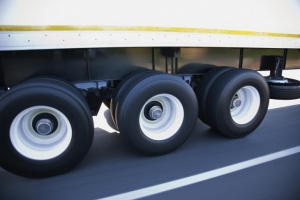
Trucks all across the United States — Canada and Mexico, too — are getting pulled over in unusually large numbers the last few days as part of the 30th annual International Roadcheck, a 72-hour campaign emphasizing the importance of keeping trucks in top operating shape and in compliance with all safety requirements and laws that runs through June 8.
Think it’s all hype? Run these numbers.
About 15 trucks or buses will be pulled over for inspection every minute during the 72-hour inspection period. Doing the math, that’s a staggering 64,800 vehicles being inspected in a very short period of time. And at peak driving times, when more of the 10,000 American, Canadian and Mexican officers who’ll be taking part in the inspection event are on duty, the number of vehicles being inspected at any one time will be even higher than the 900 per hour average.
Focusing on cargo security
Certainly, the vast majority of trucks on the road won’t be put through a Roadcheck inspection, but the elevated inspection rate — and its widespread advertisement — are designed to encourage all truck operators to get their rigs into proper operating condition, just in case they are among the nearly 65,000 big vehicles inspected.
Each year during Roadcheck, inspectors will place extra emphasis on one aspect of truck safety. This year that emphasis will be on making sure cargo — whether strapped to a flatbed or stowed in a container or tanker trailer — is properly secured. Cargo security is a critical safety aspect not only for the trucks and drivers hauling loads but also for other motorists, who could be hurt should items break free or an unexpected cargo shift cause the driver to lose control of a rig at highway speeds. That’s why many of the cargo securement violations involve tie-downs and why the CVSA and many others recommend that drivers regularly inspect tie downs to make sure they are in better-than-good condition. And that’s not just during the 72-hour International Roadcheck, but all year round.
The top five securement violations, according to the CVSA are:
- Failure to prevent shifting/loss of load
- Failure to secure truck equipment (tarps, dunnage, doors, tailgates, spare tires, etc.)
- Damaged tie-downs (unacceptable wear on chain or cuts and tears on web straps
- Insufficient tie-downs
- Loose tie-downs
But did you notice the second violation? It’s not just cargo that has to be secured, and it’s why the CVSA highlights in a free tip sheet the need to secure other equipment in the truck.
"While safe cargo securement principles and regulations apply to every item carried for delivery, they also apply to anything else on or in the truck, including dunnage, tools and equipment. Shovels, blocks, webbing, chains, spare tires, brooms, forklifts, pallet jacks, winches, ratchets, etc., all must be secured. Also, remember that an enclosed van trailer may not be sufficient securement for the load you are transporting. Many large or heavy loads may need additional securement in an enclosed van to safely secure the load. Bungee cords and tarp straps must not be used as primary securement for loads or equipment.”
Completing a full inspection in addition to cargo securement
Beyond the emphasis being placed on cargo security, inspectors this year will be conducting the North American Standard Level I Inspection on every vehicle pulled over as part of the Roadcheck program. That’s the most thorough roadside inspection possible and involves inspectors working through 37 specific checks of both the truck and its driver. Drivers will have to show, among other things, their driver’s license, hours-of-service documents, motor carrier registration, and shipping documents for their current load. Inspectors also will be checking for driver and passenger seat belt usage and any evidence of alcohol or drug use.
Rigs pulled over as part of the Roadcheck program will have their brake systems, cargo securement, coupling devices, driveline/driveshaft, and exhaust systems inspected. Trucks’ frames, fuel systems, lights and lamps, steering mechanisms, suspensions, tires, wheels, rims, and hubs will all be checked out. Cargo van and open-top trailer bodies also must pass inspection. Officers will even take a look at windshield wipers and truck cabs’ emergency exits.
The CVSA is supported in the International Roadcheck program by the Federal Motor Carrier Safety Administration and the Pipeline and Hazardous Materials Safety Administration, by the Canadian Council of Motor Transport Administrators and Transport Canada, and by Mexico’s Secretariat of Communications and Transportation. Actual inspections will be conducted by state and provincial highway safety officers or, in some cases, state, provincial or national law officers who’ve received specific training for conducting roadside truck safety inspections and who’ve passed necessary certification tests.
A final number for you: 1.5 million. That’s how many trucks have gone through inspections during 29 years of International Roadchecks.